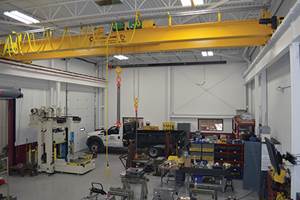Kicking the Can Down the Road
I recently had two seemingly unrelated experiences that gave me an interesting perspective about the current economy, and machine shops in particular. In early December, I was invited to attend a conference call with a group of economists. As they were discussing the condition of the Medium Three automotive companies, one of them said that he wasn’t surprised at all that they were seeking relief (a bailout) in the form of government-backed loans.
To paraphrase, he pointed out that 0.0% financing for cars was formed out of desperation, because decades of continually rising union wages and “entitlements/benefits for life” for retirees were catching up with them. They had to stimulate sales and profits to keep up, but were putting off the inevitable.
“They were kicking the can down the road,” he said. “It was a system that was unsustainable, and was bound to collapse at some point.”
A few days later, I was listening to the radio in my car. There was an interview with a private banker from a small town, discussing the credit mess and how his and other independent banks were being affected. At one point, he made a very interesting point that has stayed with me since I heard it:
The banker said that he knows everyone in town. He knows their families, their histories, their habits, their children’s names and their businesses. He said he has been successfully lending to these people for years based on this personal criteria. “And yet,” he said, “If they walked into a large corporate bank (with their systemic criteria for grading prospective borrowers) they wouldn’t lend them a dime.”
These two points got me to thinking: are machine tool manufacturers kicking the can down the road? Are they unintentionally contributing to a machining environment of unrealistically low costs for parts, tighter margins for shops and failing businesses, by selling machine tools with little or no barrier to entry to people with machining skills, but little or no business acumen?
Back in 2001, CNC machine tools had become very affordable—about the cost of a car. The shared feeling among established shop owners back then was that there were many new “one-man shops” quoting improbably low costs for work. These “journeymen-to-businessmen” were in part enabled to get into business in the first place by terms that made buying machine tools seem risk-free—like little or no financing charges and no payments for a year. And they indeed bid low and forced the costs of machined parts to new lows.
Today, while in the midst of a much worse economy, many machine tool manufacturers and distributors still offer a low barrier to entry via these same practices to create demand for their product. As it was a few years ago, a byproduct of these practices may be that many people who likely shouldn’t be in business at all are now in the machining business. Many of them still quote work unbelievably low, forcing others to follow them to the bottom of the well.
And what happens to these businesses and machines after the year is up? Machines are repossessed and these start-ups fail because the bill comes due and they’re unable to pay.
Low-cost countries, currency fluctuations, less-than-balanced trade policies, emerging markets and competition certainly contribute to the commoditized pricing of many manufactured parts and products. But might these practices by the machine tool builders—easy credit terms and a disconnected vetting process—actually contribute negatively to the overall, long-term health of our industry, as well?
Similar credit offerings have wreaked havoc on our housing and credit markets. Balloon mortgages and cheap credit gave many that really couldn’t afford either the sense that they could. They kicked the can down the road, too—until the piper came calling.
Related Content
The Critical Role of Management Representatives in ISO 9001
In ISO 9001 quality management systems, the Management Representative (MR) plays a crucial role. While the 2015 version of ISO 9001 no longer mandates this position, having a trusted management member serve as an MR remains vital for streamlining operations and maintaining quality standards.
Read MoreThe Trifecta of Competitive Toolmaking
Process, technology and people form the foundations of the business philosophy in place at Eifel Mold & Engineering.
Read MoreDynamic Tool Corporation – Creating the Team to Move Moldmaking Into the Future
For 40+ years, Dynamic Tool Corp. has offered precision tooling, emphasizing education, mentoring and innovation. The company is committed to excellence, integrity, safety and customer service, as well as inspiring growth and quality in manufacturing.
Read MoreTackling a Mold Designer Shortage
Survey findings reveal a shortage of skilled mold designers and engineers in the moldmaking community, calling for intervention through educational programs and exploration of training alternatives while seeking input from those who have addressed the issue successfully.
Read MoreRead Next
How to Use Strategic Planning Tools, Data to Manage the Human Side of Business
Q&A with Marion Wells, MMT EAB member and founder of Human Asset Management.
Read MoreAre You a Moldmaker Considering 3D Printing? Consider the 3D Printing Workshop at NPE2024
Presentations will cover 3D printing for mold tooling, material innovation, product development, bridge production and full-scale, high-volume additive manufacturing.
Read More

















